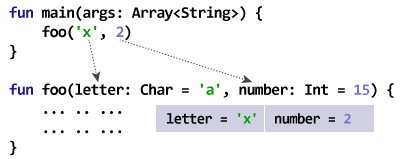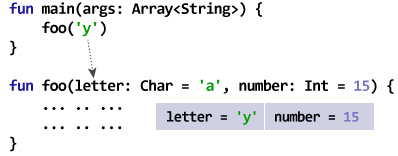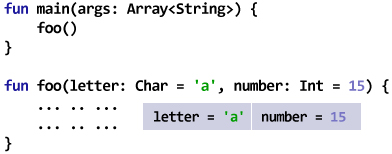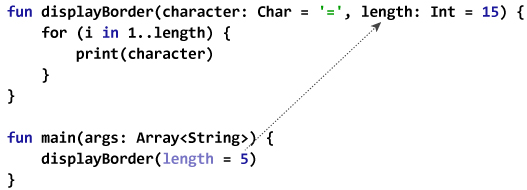# Kotlin 默认和命名参数
> 原文: [https://www.programiz.com/kotlin-programming/default-named-arguments](https://www.programiz.com/kotlin-programming/default-named-arguments)
#### 在本文中,您将在示例的帮助下了解默认参数和命名参数。
## Kotlin 默认参数
在 Kotlin 中,您可以为函数定义中的参数提供默认值。
如果通过传递的参数调用该函数,则将这些参数用作参数。 但是,如果在不传递参数的情况下调用该函数,则会使用默认参数。
* * *
### 默认参数如何工作?
**情况 I:所有参数均传递**
* * *

函数`foo()`具有两个参数。 参数提供有默认值。 但是,通过在上述程序中传递两个参数来调用`foo()`。 因此,不使用默认参数。
在`foo()`函数内,`letter`和`num`的值分别为`'x'`和`2`。
**情况 II:未传递所有参数**
* * *

在此,仅一个(第一个)参数传递给`foo()`函数。 因此,第一个参数使用传递给函数的值。 但是,第二个参数`num`将采用默认值,因为在函数调用期间未传递第二个参数。
在`foo()`函数内,`letter`和`num`的值分别为`'y'`和`15`。
**情况 III:不传递任何参数**
* * *

在此,不传递任何参数就调用`foo()`函数。 因此,两个参数都使用其默认值。
在`foo()`函数内,`letter`和`num`的值分别为`'a'`和`15`。
* * *
### 示例:Kotlin 默认参数
```kt
fun displayBorder(character: Char = '=', length: Int = 15) {
for (i in 1..length) {
print(character)
}
}
fun main(args: Array<String>) {
println("Output when no argument is passed:")
displayBorder()
println("\n\n'*' is used as a first argument.")
println("Output when first argument is passed:")
displayBorder('*')
println("\n\n'*' is used as a first argument.")
println("5 is used as a second argument.")
println("Output when both arguments are passed:")
displayBorder('*', 5)
}
```
运行该程序时,输出为:
```kt
Output when no argument is passed:
===============
'*' is used as a first argument.
Output when first argument is passed:
***************
'*' is used as a first argument.
5 is used as a second argument.
Output when both arguments are passed:
*****
```
* * *
## Kotlin 命名参数
在讨论命名参数之前,让我们考虑对上面的代码进行一些修改:
```kt
fun displayBorder(character: Char = '=', length: Int = 15) {
for (i in 1..length) {
print(character)
}
}
fun main(args: Array<String>) {
displayBorder(5)
}
```
在这里,我们试图将第二个参数传递给`displayBorder()`函数,并使用默认参数作为第一个参数。 但是,此代码将提供使用错误。 这是因为编译器认为我们正在尝试为字符(`Char`类型)提供 5(`Int`值)。
为了解决这种情况,可以使用命名参数。 方法如下:
* * *
### 示例:Kotlin 命名参数
```kt
fun displayBorder(character: Char = '=', length: Int = 15) {
for (i in 1..length) {
print(character)
}
}
fun main(args: Array<String>) {
displayBorder(length = 5)
}
```
运行该程序时,输出为:
```kt
=====
```
在上面的程序中,我们使用命名参数(`length = 5`)指定函数定义中的`length`参数应采用此值(与参数的位置无关)。

第一个参数`character`使用程序中的默认值`'='`。
- Programiz C 语言教程
- C 简介
- C 关键字和标识符
- C 变量,常量和字面值
- C 数据类型
- C 输入输出(I/O)
- C 编程运算符
- C 简单示例
- C 流程控制
- C if...else语句
- C for循环
- C while和do...while循环
- C break和continue
- C switch语句
- C goto声明
- C 控制流程示例
- C 函数
- C 函数
- C 用户定义的函数
- C 编程中用户定义函数的类型
- C 递归
- C 存储类
- C 函数示例
- C 数组
- C 数组
- C 多维数组
- 将数组传递给 C 中的函数
- C 编程指针
- C 指针
- 数组和指针之间的关系
- C 按引用调用:使用指针
- C 动态内存分配
- C 数组和指针示例
- C 字符串
- C 编程字符串
- 使用库函数进行 C 编程中的字符串操作
- C 编程中的字符串示例
- 结构与联合
- 结构
- 结构和指针
- C 结构与函数
- C 联合
- C 结构示例
- C 文件
- C 文件处理
- C 文件示例
- 其他主题
- 枚举
- C 预处理器和宏
- C 标准库函数
- C 示例
- C 程序:打印金字塔和图案
- C 程序:检查数字是否为质数
- C 程序:检查数字是否为回文
- C 程序:HelloWorld
- C 程序:打印整数(由用户输入)
- C 程序:相加两个整数
- C 程序:将两个浮点数相乘
- C 程序:查找字符的 ASCII 值
- C 程序:商和余数
- C 程序:查找int,float,double和char的大小
- C 程序:long关键字演示
- C 程序:交换两个数字
- C 程序:检查数字是偶数还是奇数
- C 程序:检查字符是元音还是辅音
- C 程序:查找三个数字中最大的数字
- C 程序:查找二次方程的根
- C 程序:检查闰年
- C 程序:检查数字是正数还是负数
- C 程序:检查字符是否为字母
- C 程序:计算自然数之和
- C 程序:查找数字阶乘
- C 程序:生成乘法表
- C 程序:显示斐波那契数列
- C 程序:查找两个数字的 GCD
- C 程序:查找两个数字的 LCM
- C 程序:使用循环从 A 到 Z 显示字符
- C 程序:计算整数中的位数
- C 程序:反转数字
- C 程序:计算数字的幂
- C 程序:显示两个间隔之间的质数
- C 程序:检查阿姆斯特朗数
- C 程序:在两个间隔之间显示阿姆斯特朗数
- C 程序:显示数字因数
- C 程序:使用switch...case制作一个简单的计算器
- C 程序:使用函数显示区间内的质数
- C 程序:使用用户定义的函数检查质数或阿姆斯特朗数
- C 程序:检查一个数字是否可以表示为两个质数之和
- C 程序:使用递归查找自然数之和
- C 程序:使用递归查找数字的阶乘
- C 程序:使用递归查找 GCD
- C 程序:将二进制数转换为十进制,反之亦然
- C 程序:将八进制数转换为十进制,反之亦然
- C 程序:将二进制数转换为八进制,反之亦然
- C 程序:使用递归来反转句子
- C 程序:使用递归计算幂
- C 程序:使用数组计算平均值
- C 程序:查找数组中的最大元素
- C 程序:计算标准差
- C 程序:使用多维数组相加两个矩阵
- C 程序:使用多维数组将两个矩阵相乘
- C 程序:查找矩阵的转置
- C 程序:通过将矩阵传递给函数来将两个矩阵相乘
- C 程序:使用指针访问数组元素
- C 程序:使用按引用调用以循环顺序交换数字
- C 程序:使用动态内存分配查找最大数字
- C 程序:查找字符串中字符的频率
- C 程序:计算元音,辅音等的数量
- C 程序:删除字符串中除字母之外的所有字符
- C 程序:查找字符串的长度
- C 程序:连接两个字符串
- C 程序:不使用strcpy()复制字符串
- C 程序:按字典顺序(字典顺序)对元素进行排序
- C 程序:使用程序存储学生信息
- C 程序:使用结构相加两个距离(以英寸-英尺系统为单位)
- C 程序:通过将结构传递给函数来相加两个复数
- C 程序:计算两个时间段之间的差异
- C 程序:使用结构存储学生信息
- C 程序:在结构中动态存储数据
- C 程序:将句子写入文件
- C 程序:从文件中读取一行并显示它
- C 程序:显示自己的源代码作为输出
- Programiz C++ 教程
- C++ 简介
- C++ 变量,文字和常量
- C++ 数据类型
- C++ 基本输入/输出
- C++ 类型转换
- C++ 运算符
- C++ 注释
- C++ 流控制
- C++ if,if...else和嵌套if...else
- C++ for循环
- C++ while和do...while循环
- C++ break语句
- C++ switch..case语句
- C++ goto语句
- C++ 函数
- C++ 函数
- C++ 中用户定义函数的类型
- C++ 函数重载
- C++ 编程默认参数(参数)
- C++ 存储类
- C++ 递归
- C++ 通过引用返回
- C++ 数组和字符串
- C++ 数组
- C++ 多维数组
- 在 C++ 编程中将数组传递给函数
- C++ 字符串
- C++ 结构
- C++ 结构
- C++ 结构与功能
- C++ 结构指针
- C++ 枚举
- C++ 对象和类
- C++ 类和对象
- C++ 构造器
- 如何通过 C++ 中的函数传递和返回对象?
- C++ 运算符重载
- C++ 指针
- C++ 指针
- C++ 指针和数组
- 通过引用进行 C++ 调用:使用指针[包含示例]
- C++ 内存管理:new和delete
- C++ 继承
- C++ 继承
- C++ 编程中的公共,受保护和私有继承
- C++ 函数覆盖
- C++ 多重,多层和层次继承
- C++ 友元函数和友元类
- C++ 虚函数
- C++ 模板
- C++ 示例
- C++ 程序:HelloWorld
- C++ 程序:检查数字是否为质数
- C++ 程序:创建金字塔和图案
- C++ 程序:加两个数字
- C++ 程序:打印用户输入的数字
- C++ 程序:查找商数和余数
- C++ 程序:在系统中查找int,float,double和char的大小
- C++ 程序:交换两个数字
- C++ 程序:检查数字是偶数还是奇数
- C++ 程序:检查字符是元音还是辅音
- C++ 程序:查找三个数字中最大的数字
- C++ 程序:查找二次方程式的所有根
- C++ 程序:计算自然数之和
- C++ 程序:检查闰年
- C++ 程序:查找阶乘
- C++ 程序:生成乘法表
- C++ 程序:显示斐波那契数列
- C++ 程序:查找 GCD
- C++ 程序:查找 LCM
- C++ 程序:反转数字
- C++ 程序:计算数字的幂
- C++ 程序:递增++和递减--运算符重载
- C++ 程序:使用运算符重载减去复数
- C++ 程序:查找字符的 ASCII 值
- C++ 程序:将两个数相乘
- C++ 程序:检查数字是否为回文
- C++ 程序:显示两个间隔之间的质数
- C++ 程序:检查阿姆斯特朗数
- C++ 程序:显示两个间隔之间的阿姆斯特朗数
- C++ 程序:显示数字的因数
- C++ 程序:使用switch...case的简单的加减乘除计算器
- C++ 程序:使用函数显示两个时间间隔之间的质数
- C++ 程序:通过创建函数来检查质数
- C++ 程序:检查数字是否可以表示为两个质数之和
- C++ 程序:使用递归查找自然数之和
- C++ 程序:使用递归计算数字的阶乘
- C++ 程序:使用递归查找 GCD
- C++ 程序:将二进制数转换为十进制,反之亦然
- C++ 程序:将八进制数转换为十进制,反之亦然
- C++ 程序:将二进制数转换为八进制,反之亦然
- C++ 程序:使用递归来反转句子
- C++ 程序:使用递归计算幂
- C++ 程序:使用数组计算数字平均值
- C++ 程序:查找数组的最大元素
- C++ 程序:计算标准差
- C++ 程序:使用多维数组相加两个矩阵
- C++ 程序:使用多维数组将两个矩阵相乘
- C++ 程序:查找矩阵的转置
- C++ 程序:通过将矩阵传递给函数将两个矩阵相乘
- C++ 程序:使用指针访问数组元素
- C++ 程序:使用引用调用以循环顺序交换数字
- C++ 程序:查找字符串中字符的频率
- C++ 程序:查找字符串中元音,辅音,数字和空白的数量
- C++ 程序:删除字符串中除字母之外的所有字符
- C++ 程序:查找字符串的长度
- C++ 程序:连接两个字符串
- C++ 程序:复制字符串
- C++ 程序:按字典顺序(字典顺序)对元素进行排序
- C++ 程序:在结构中存储学生的信息
- C++ 程序:使用结构相加两个距离(以英寸-英尺为单位)
- C++ 程序:通过将结构传递给函数来添加复数
- C++ 程序:计算两个时间段之间的差异
- C++ 程序:使用结构存储和显示信息
- Programiz C# 教程
- 简介
- C# Hello World - 您的第一个 C# 程序
- C# 关键字和标识符
- C# 变量和(原始)数据类型
- C# 运算符
- C# 基本输入和输出
- C# 表达式,语句和块(带有示例)
- C# 注释
- 流程控制
- C# if,if...else,if...else if和嵌套if语句
- C# for循环
- C# while和do...while循环
- C# foreach循环
- C# switch语句
- C# 三元(?:)运算符
- 其他话题
- C# 按位和移位运算符
- C# 预处理程序指令
- C# 编程中的命名空间
- C# 部分类和部分方法
- Programiz 数据结构和算法教程
- DSA 简介
- 什么是算法?
- 为什么要学习数据结构和算法?
- 渐近分析
- 主定理
- 分治算法
- 数据结构(一)
- 栈
- 队列
- 队列类型
- 循环队列
- 优先队列
- 双端队列
- 数据结构(二)
- 链表
- 链表操作:遍历,插入和删除
- 链表的类型 - 单链,双链和循环链
- 哈希表
- 堆数据结构
- 斐波那契堆
- 减小斐波那契堆上的键和删除节点的操作
- 基于树的 DSA(I)
- 树数据结构
- 树遍历 - 中序,前序和后序
- 满二叉树
- 满二叉树
- 完美二叉树
- 完全二叉树
- 平衡二叉树
- 二叉搜索树(BST)
- AVL 树
- 基于树的 DSA(II)
- B 树
- 插入 B 树
- 从 B 树删除
- B+ 树
- 在 B+ 树上插入
- 从 B+ 树中删除
- 红黑树
- 插入红黑树
- 从红黑树中删除
- 基于图的 DSA
- 图数据结构
- 生成树和最小生成树
- 强连通的组件
- 邻接矩阵
- 邻接表
- DFS 算法
- BFS 算法
- Bellman Ford 算法
- 排序和搜索算法
- 冒泡排序算法
- 选择排序算法
- 插入排序算法
- 归并排序算法
- 快速排序算法
- 计数排序算法
- 基数排序算法
- 桶排序算法
- 堆排序算法
- Shell 排序算法
- 线性搜索
- 二分搜索
- 贪婪算法
- 贪婪算法
- Ford-Fulkerson 算法
- Dijkstra 算法
- Kruskal 算法
- Prim 算法
- 霍夫曼编码
- 动态规划
- 动态规划
- Floyd-Warshall 算法
- 最长公共子序列
- 其他算法
- 回溯算法
- Rabin-Karp 算法
- Programiz Java 教程
- Java 简介
- Java HelloWorld 程序
- Java JDK,JRE 和 JVM
- Java 变量和(原始)数据类型
- Java 运算符
- Java 基本输入和输出
- Java 表达式,语句和块
- Java 注释
- Java 流程控制
- Java if,if...else语句
- Java switch语句
- Java for循环
- Java for-each循环(增强循环)
- Java while和do...while循环
- Java Break语句
- Java continue语句
- Java 数组
- Java 数组
- Java 多维数组
- Java 复制数组
- Java OOP(I)
- Java 类和对象
- Java 方法
- Java 构造器
- Java 字符串
- Java 访问修饰符
- Java this关键字
- Java final关键字
- Java 递归
- Java instanceof
- Java OOP(II)
- Java 继承
- Java 方法覆盖
- Java super
- Java 抽象类和抽象方法
- Java 接口
- Java 多态
- Java 封装
- Java OOP(III)
- Java 嵌套和内部类
- Java 静态嵌套类
- Java 匿名类
- Java 单例
- Java 枚举
- Java 枚举构造器
- Java 枚举字符串
- Java 反射
- Java 异常处理
- Java 异常
- Java 异常处理
- Java throw
- Java 捕获多个异常
- Java try-with-resources
- Java 注解
- Java 注解类型
- Java 日志
- Java 断言
- Java 列表
- Java 集合框架
- Java Collection接口
- Java List接口
- Java ArrayList类
- Java Vector
- Java Stack类
- Java 队列
- Java Queue接口
- Java PriorityQueue
- Java Deque接口
- Java LinkedList
- Java ArrayDeque
- Java BlockingQueue
- Java ArrayBlockingQueue
- Java LinkedBlockingQueue
- Java 映射
- Java Map接口
- Java HashMap
- Java LinkedHashMap
- Java WeakHashMap
- Java EnumMap
- Java SortedMap接口
- Java NavigableMap接口
- Java TreeMap
- Java ConcurrentMap接口
- Java ConcurrentHashMap
- Java 集
- Java Set接口
- Java HashSet类
- Java EnumSet
- Java LinkedHashSet
- Java SortedSet接口
- Java NavigableSet接口
- Java TreeSet
- Java 算法
- Java Iterator接口
- Java ListIterator接口
- Java I/O 流
- Java I/O 流
- Java InputStream类
- Java OutputStream类
- Java FileInputStream类
- Java FileOutputStream类
- Java ByteArrayInputStream类
- Java ByteArrayOutputStream类
- Java ObjectInputStream类
- Java ObjectOutputStream类
- Java BufferedInputStream类
- Java BufferedOutputStream类
- Java PrintStream类
- Java 读取器/写入器
- Java Reader类
- Java Writer类
- Java InputStreamReader类
- Java OutputStreamWriter类
- Java FileReader类
- Java FileWriter类
- Java BufferedReader类
- Java BufferedWriter类
- Java StringReader类
- Java StringWriter类
- Java PrintWriter类
- 其他主题
- Java Scanner类
- Java 类型转换
- Java 自动装箱和拆箱
- Java Lambda 表达式
- Java 泛型
- Java File类
- Java 包装器类
- Java 命令行参数
- Java 实例
- Java 程序:检查数字是否为质数
- Java 程序:显示斐波那契数列
- Java 程序:创建金字塔和图案
- Java 程序:反转数字
- Java 程序:打印整数(由用户输入)
- Java 程序:相加两个整数
- Java 程序:将两个浮点数相乘
- Java 程序:查找字符的 ASCII 值
- Java 程序:计算商数和余数
- Java 程序:交换两个数字
- Java 程序:检查数字是偶数还是奇数
- Java 程序:检查字母是元音还是辅音
- Java 程序:在三个数字中找到最大值
- Java 程序:查找二次方程式的所有根
- Java 程序:检查闰年
- Java 程序:检查数字是正数还是负数
- Java 程序:检查字符是否为字母
- Java 程序:计算自然数之和
- Java 程序:查找数字的阶乘
- Java 程序:生成乘法表
- Java 程序:显示斐波那契数列
- Java 程序:查找两个数字的 GCD
- Java 程序:查找两个数字的 LCM
- Java 程序:使用循环从 A 到 Z 显示字符
- Java 程序:计算整数的位数
- Java 程序:计算数字的幂
- Java 程序:检查数字是否为回文
- Java 程序:检查数字是否为质数
- Java 程序:显示两个时间间隔之间的质数
- Java 程序:检查阿姆斯特朗数
- Java 程序:显示两个间隔之间的阿姆斯特朗数
- Java 程序:使用函数显示间隔之间的质数
- Java 程序:使用函数显示间隔之间的阿姆斯特朗数
- Java 程序:以显示数字的因数
- Java 程序:使用switch...case创建一个简单的计算器
- Java 程序:检查一个数字是否可以表示为两个质数之和
- Java 程序:使用递归查找自然数之和
- Java 程序:使用递归查找数字的阶乘
- Java 程序:使用递归查找 GCD
- Java 程序:将二进制数转换为十进制,反之亦然
- Java 程序:将八进制数转换为十进制,反之亦然
- Java 程序:将二进制数转换为八进制,反之亦然
- Java 程序:使用递归来反转句子
- Java 程序:使用递归来计算幂
- Java 程序:使用数组计算平均值
- Java 程序:查找数组的最大元素
- Java 程序:计算标准差
- Java 程序:使用多维数组相加两个矩阵
- Java 程序:使用多维数组相乘矩阵
- Java 程序:通过将矩阵传递给函数来将两个矩阵相乘
- Java 程序:查找矩阵转置
- Java 程序:查找字符串中字符的频率
- Java 程序:计算句子中元音和辅音的数量
- Java 程序:按字典顺序对元素进行排序
- Java 程序:通过将对象传递给函数来相加两个复数
- Java 程序:计算两个时间段之间的差异
- Java 程序:从字符串中删除所有空格
- Java 程序:打印数组
- Java 程序:将字符串转换为日期
- Java 程序:将数字四舍五入到 n 个小数位
- Java 程序:连接两个数组
- Java 程序:将字符转换为字符串,反之亦然
- Java 程序:检查数组是否包含给定值
- Java 程序:检查字符串是否为空或null
- Java 程序:获取当前日期/时间
- Java 程序:将毫秒转换为分钟和秒
- Java 程序:相加两个日期
- Java 程序:连接两个列表
- Java 程序:将列表(ArrayList)转换为数组,反之亦然
- Java 程序:获取当前工作目录
- Java 程序:将映射(HashMap)转换为列表
- Java 程序:将数组转换为集(HashSet),反之亦然
- Java 程序:将字节数组转换为十六进制
- Java 程序:从文件内容创建字符串
- Java 程序:将文本附加到现有文件
- Java 程序:将栈跟踪转换为字符串
- Java 程序:将文件转换为字节数组,反之亦然
- Java 程序:将InputStream转换为字符串
- Java 程序:将OutputStream转换为字符串
- Java 程序:按字符串值查找枚举
- Java 程序:比较字符串
- Java 程序:按值对映射进行排序
- Java 程序:按属性对自定义对象的ArrayList进行排序
- Java 程序:检查字符串是否为数字
- Java 程序:创建目录
- Java 程序:重命名文件
- Java 程序:列出目录中的文件
- Java 程序:复制文件
- Programiz Kotlin 教程
- Kotlin 简介
- Kotlin HelloWorld - 您的 Kotlin 程序
- Kotlin 变量和原始类型
- Kotlin 运算符
- Kotlin 类型转换
- Kotlin 表达式,语句和块
- Kotlin 注释
- Kotlin 基本输入/输出
- Kotlin 流程控制
- Kotlin if表达式
- Kotlin when表达式
- Kotlin while和do...while循环
- Kotlin for循环
- Kotlin break表达式
- Kotlin continue表达式
- Kotlin 函数
- Kotlin 函数
- Kotlin 中缀函数调用
- Kotlin 默认和命名参数
- Kotlin 递归(递归函数)和尾递归
- Kotlin OOP
- Kotlin 类和对象
- Kotlin 构造器
- Kotlin 获取器和设置器
- Kotlin 继承
- Kotlin 可见性修饰符
- Kotlin 抽象类
- Kotlin 接口
- Kotlin 嵌套和内部类
- Kotlin 数据类
- Kotlin 密封类
- Kotlin 对象声明和表达式
- Kotlin 伴随对象
- Kotlin 扩展函数
- Kotlin 运算符重载
- Kotlin 示例
- Kotlin 程序:获取当前日期/时间
- Kotlin 程序:将列表(ArrayList)转换为Array,反之亦然
- Kotlin 程序:将字符串转换为日期
- Kotlin 程序:按属性对自定义对象的ArrayList进行排序
- Kotlin 程序:打印整数(由用户输入)
- Kotlin 程序:相加两个整数
- Kotlin 程序:将两个浮点数相乘
- Kotlin 程序:查找字符的 ASCII 值
- Kotlin 程序:计算商数和余数
- Kotlin 程序:交换两个数字
- Kotlin 程序:检查数字是偶数还是奇数
- Kotlin 程序:检查字母是元音还是辅音
- Kotlin 程序:在三个数字中找到最大的一个
- Kotlin 程序:查找二次方程的所有根
- Kotlin 程序:检查闰年
- Kotlin 程序:检查数字是正数还是负数
- Kotlin 程序:检查字符是否为字母
- Kotlin 程序:计算自然数之和
- Kotlin 程序:查找数字的阶乘
- Kotlin 程序:生成乘法表
- Kotlin 程序:展示斐波那契数列
- Kotlin 程序:查找两个数字的 GCD
- Kotlin 程序:查找两个数字的 LCM
- Kotlin 程序:使用循环从 A 到 Z 显示字符
- Kotlin 程序:计算整数位数
- Kotlin 程序:反转数字
- Kotlin 程序:计算数字的幂
- Kotlin 程序:检查数字是否为回文
- Kotlin 程序:检查数字是否为质数
- Kotlin 程序:显示两个间隔之间的质数
- Kotlin 程序:检查阿姆斯特朗数
- Kotlin 程序:显示两个间隔之间的阿姆斯特朗数
- Kotlin 程序:使用函数显示间隔之间的质数
- Kotlin 程序:使用函数显示间隔之间的阿姆斯特朗数
- Kotlin 程序:显示数字因数
- Kotlin 程序:使用switch...case制作一个简单的计算器
- Kotlin 程序:检查一个数字是否可以表示为两个质数之和
- Kotlin 程序:使用递归找到自然数之和
- Kotlin 程序:使用递归查找数字的阶乘
- Kotlin 程序:使用递归查找 GCD
- Kotlin 程序:将二进制数转换为十进制,反之亦然
- Kotlin 程序:将八进制数转换为十进制,反之亦然
- Kotlin 程序:将二进制数转换为八进制,反之亦然
- Kotlin 程序:使用递归来反转句子
- Kotlin 程序:使用递归来计算幂
- Kotlin 程序:使用数组计算平均值
- Kotlin 程序:在数组中查找最大的元素
- Kotlin 程序:计算标准差
- Kotlin 程序:使用多维数组相加两个矩阵
- Kotlin 程序:使用多维数组乘以矩阵
- Kotlin 程序:通过将矩阵传递给函数来将两个矩阵相乘
- Kotlin 程序:查找矩阵的转置
- Kotlin 程序:查找字符串中字符的频率
- Kotlin 程序:计算句子中元音和辅音的数量
- Kotlin 程序:按字典顺序(字典顺序)对元素进行排序
- Kotlin 程序:通过将类传递给函数来相加两个复数
- Kotlin 程序:计算两个时间段之间的差异
- Kotlin 程序:创建金字塔和图案
- Kotlin 程序:从字符串中删除所有空格
- Kotlin 程序:打印数组
- Kotlin 程序:将数字四舍五入到 n 个小数位
- Kotlin 程序:连接两个数组
- Kotlin 程序:将字符转换为字符串并反之
- Kotlin 程序:检查数组是否包含给定值
- Kotlin 程序:检查字符串是否为空或null
- Kotlin 程序:将毫秒转换为分钟
- Kotlin 程序:相加两个日期
- Kotlin 程序:连接两个列表
- Kotlin 程序:获取当前工作目录
- Kotlin 程序:将映射(HashMap)转换为列表
- Kotlin 程序:将数组转换为Set(HashSet),反之亦然
- Kotlin 程序:将字节数组转换为十六进制
- Kotlin 程序:从文件内容创建字符串
- Kotlin 程序:将文本附加到现有文件
- Kotlin 程序:将栈跟踪转换为字符串
- Kotlin 程序:将文件转换为字节数组,反之亦然
- Kotlin 程序:将InputStream转换为字符串
- Kotlin 程序:将OutputStream转换为字符串
- Kotlin 程序:通过字符串值查找枚举
- Kotlin 程序:比较字符串
- Kotlin 程序:按值对映射排序
- Kotlin 程序:检查字符串是否为数字
- Programiz Python 教程
- Python 简介
- 如何开始使用 Python?
- Python 关键字和标识符
- Python 语句,缩进和注释
- Python 变量,常量和字面值
- Python 数据类型
- Python 类型转换
- Python 输入,输出和导入
- Python 运算符
- Python 命名空间和范围
- Python 流程控制
- Python if...else语句
- Python for循环
- Python While循环
- Python break和continue
- Python pass语句
- Python 函数
- Python 函数
- Python 函数参数
- Python 递归
- Python 匿名/ Lambda 函数
- Python 全局,局部和非局部变量
- Python global关键字
- Python 模块
- Python 包
- Python 数据类型
- Python 数字,类型转换和数学
- Python 列表
- Python 元组
- Python 字符串
- Python 集
- Python 字典
- Python 文件
- Python 文件 I/O
- Python 目录和文件管理
- Python 错误和内置异常
- Python 使用try,except和finally语句的异常处理
- Python 自定义异常
- Python 对象和类
- Python 面向对象编程
- Python 对象和类
- Python 继承
- Python 多重继承
- Python 运算符重载
- Python 高级主题
- Python 迭代器
- Python 生成器
- Python 闭包
- Python 装饰器
- Python @property装饰器
- Python 正则表达式
- Python 日期时间
- Python 日期时间
- Python strftime()
- Python strptime()
- 如何在 Python 中获取当前日期和时间?
- Python 获取当前时间
- Python 日期时间到时间戳,反之亦然
- Python time模块
- Python sleep()
- Python 示例
- Python 程序:检查质数
- Python 程序:相加两个数字
- Python 程序:查找数字阶乘
- Python 程序:制作一个简单的计算器
- Python 程序:打印 Helloworld
- Python 程序:查找平方根
- Python 程序:计算三角形的面积
- Python 程序:求解二次方程式
- Python 程序:交换两个变量
- Python 程序:生成随机数
- Python 程序:将公里转换为英里
- Python 程序:将摄氏温度转换为华氏温度
- Python 程序:检查数字是正数,负数还是 0
- Python 程序:检查数字是奇数还是偶数
- Python 程序:检查闰年
- Python 程序:在三个数字中找到最大的
- Python 程序:检查质数
- Python 程序:打印一个间隔内的所有质数
- Python 程序:查找数字阶乘
- Python 程序:显示乘法表
- Python 程序:打印斐波那契序列
- Python 程序:检查阿姆斯特朗数
- Python 程序:查找间隔内的阿姆斯特朗数
- Python 程序:查找自然数总和
- Python 程序:使用匿名函数显示 2 的幂
- Python 程序:查找可被另一个数整除的数字
- Python 程序:将十进制转换为二进制,八进制和十六进制
- Python 程序:查找字符的 ASCII 值
- Python 程序:查找 HCF 或 GCD
- Python 程序:查找 LCM
- Python 程序:查找数字的因数
- Python 程序:制作一个简单的计算器
- Python 程序:打乱纸牌
- Python 程序:显示日历
- Python 程序:使用递归显示斐波那契数列
- Python 程序:使用递归查找自然数之和
- Python 程序:使用递归查找数字的阶乘
- Python 程序:使用递归将十进制转换为二进制
- Python 程序:相加两个矩阵
- Python 程序:转置矩阵
- Python 程序:将两个矩阵相乘
- Python 程序:检查字符串是否为回文
- Python 程序:从字符串中删除标点符号
- Python 程序:按字母顺序对单词进行排序
- Python 程序:演示不同的集合操作
- Python 程序:计算每个元音的数量
- Python 程序:合并邮件
- Python 程序:查找图像的大小(分辨率)
- Python 程序:查找文件哈希
- Programiz Swift 教程
- Swift 介绍
- Swift HelloWorld 程序
- Swift 变量,常量和字面值
- Swift 数据类型
- Swift 可选项
- Swift 的字符和字符串
- Swift 基本输入和输出
- Swift 表达式,语句和代码块
- Swift 注释
- Swift 运算符
- Swift 运算符
- Swift 运算符的优先级和关联性
- Swift 三元条件运算符
- Swift 按位和移位运算符
- Seift 流程控制
- Swift if,if...else语句
- switch语句
- Swift for-in循环
- Swift while和repeat...while循环
- Swift 中的嵌套循环
- break语句
- continue语句
- Guard语句
- Swift 集合
- Swift 数组
- Swift 集
- Swift 字典
- Swift 函数
- Swift 函数
- Swift 函数参数和返回值
- Swift 嵌套函数
- Swift 递归
- Swift 范围
- Swift 函数重载
- Swift 进阶
- Swift 闭包
- Swift 类型别名
